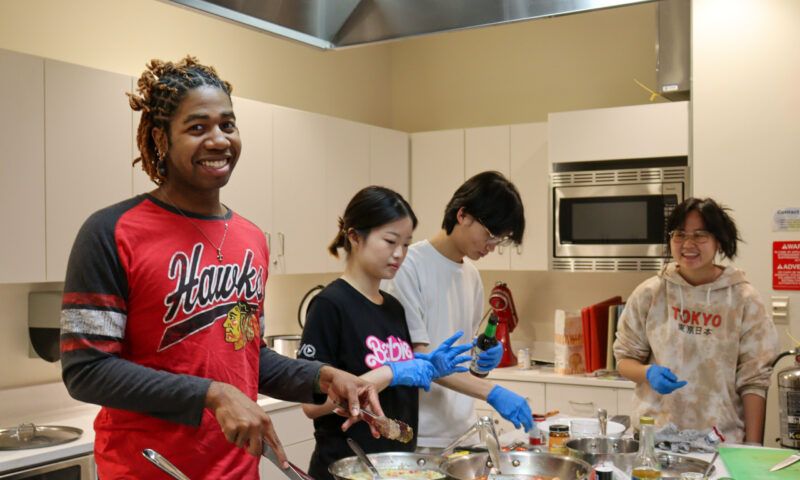UR’s French Toast club, officially recognized as an organization in Fall 2024, aims to share the language and culture of the Francophone world without any expectations of prospective members understanding or speaking French.
Despite the club’s logo — a tuxedoed piece of French toast adorably nicknamed Frenchie — their name is actually a reference to a toast (“santé”) between people. “It is a French club, not necessarily a French toast club,” junior and President Kevin Johnson said.
“I don’t expect people to come in and know French at all, and actually … that’s the point,” Johnson said. “You come in and learn it and just … have fun. If I put a barrier like that, [it] means there would be a lot less people coming … and that’s not what we want, you know? You can come in at any level. Just come and have fun.”
Senior Katy Gao, French Toast’s public relations chair, had no experience with French before joining the club, but has been learning through club events.
“Honestly, I was just looking for something a little bit new and something a little out of my comfort zone,” Gao said. “I’ve never taken French before so it’s kind of … funny how I’m actively involved on e-board.”
Recently, French Toast expanded its activities with “Chopped,” an event in which three teams competed to make the best dish and earn a box of Dunkin’ Donuts. After a quick planning period, the teams were let loose in the kitchen, permitted to use any of the ingredients set out (the more ingredients they used, the higher their odds of winning).
“We made a neo-impressionist reinterpretation of what it means to smile,” first-time French Toast attendee and senior Robert Ghetiu said, describing his team’s dish as looking like a smiley-face and containing zucchini, eggplant, couscous, white rice, and carrots. His team took second place.
Business Manager and junior Melanie Mathurin was one of the Chopped judges and its host. Mathurin, an international student from St. Lucia, appreciates that the club teaches about and engages with Francophone culture beyond France itself. “I think there’s a lot of culture beyond France that we overlook sometimes,” Mathurin said. “I really like the statement of this club, involving other Francophone countries like Cameroon, Senegal, even Québec [and] Haiti.”
Mathurin picked ingredients from Senegalese recipes to have the competitors use.
After the event, Mathurin noted that “Judging the competition was very fun, we had very close calls. Each team did amazing, just some mishaps here and there with slight seasonings.” The other two dishes were soup with risotto and a rice dish with naan, taking third and first place respectively.
Food is a big part of French Toast, according to Johnson. Most of their meetings — on alternating Saturdays — take place in the Douglass Community Kitchen. “The best way to bring people together is through food,” he said.
Normally, it’s e-board members cooking and the attendees eating. Last spring, the club hosted a French café event, where e-board members made hot chocolate from scratch accompanied by other treats.
“We had [attendees] order in French and we had little Post-it notes or some kind of printed cards where they’ll teach them the phrases that they’ll need to say in order for us to respond in French back,” Gao, who served as one of the faux waiters at the French Café event said. “That was very cute.”
Another recurring event is a collaboration with Studio X and the Center for Education Abroad, during which members take a virtual reality tour of the French-speaking world, a “Tour du monde francophone,” and learn about French study abroad offerings. Johnson himself studied abroad in France and discussed his experiences at the event.
Looking ahead to the future of French Toast, Johnson and Gao both highlighted French Toast’s annual Mardi Gras event coming up next semester. Gao explained that with a more flexible budget this year, they’re hoping to go big. “We’re planning to have ‘une grande fête de mardi gras,’” Johnson said. “And that’s all I’ll say about that.”


Dining and Cooking